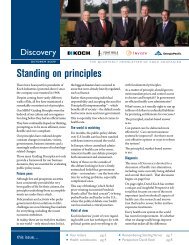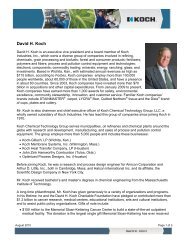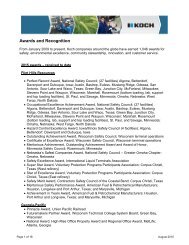human
April 2009 - Koch Industries, Inc.
April 2009 - Koch Industries, Inc.
- No tags were found...
You also want an ePaper? Increase the reach of your titles
YUMPU automatically turns print PDFs into web optimized ePapers that Google loves.
PERSPECTIVE<br />
by Ron Vaupel<br />
KII vice president,<br />
Business development<br />
8<br />
For most of this decade, our<br />
business development<br />
group worked overtime to<br />
help various Koch companies<br />
make more than $32 billion in<br />
acquisitions and investments.<br />
But now, given the global<br />
economic crisis, we are rethinking<br />
everything – especially new<br />
acquisitions.<br />
Unlike Koch Industries, many<br />
acquiring companies are now<br />
so overleveraged (debt-ridden)<br />
and undercapitalized (short of<br />
cash) that they cannot grow<br />
and may not even survive.<br />
The challenge for KII’s<br />
business development group is<br />
to help our businesses find the<br />
best alternatives for investing<br />
capital in this extremely challenging<br />
environment.<br />
Bye-bye bubble<br />
What happened in the housing<br />
market also happened in the<br />
world of industry. That is, asset<br />
values and demand inflated at a<br />
phenomenal pace, fueled by<br />
government policies promoting<br />
cheap and plentiful debt.<br />
“We are rethinking everything.”<br />
Countless business acquisitions<br />
were made using extremely<br />
high leverage, even<br />
though higher debt levels<br />
involve significantly higher risk.<br />
When the credit bubble burst,<br />
values began plummeting, leaving<br />
thousands of businesses<br />
(and millions of homeowners)<br />
owing far more for their recent<br />
purchases than they are worth.<br />
You might think this devaluation<br />
represents an enormous<br />
buying opportunity. The<br />
problem is, even at today’s<br />
lower prices, most assets are<br />
still vastly overpriced.<br />
It may take years to fully<br />
resolve this situation and absorb<br />
the excesses in our economy.<br />
Meanwhile, a flood of interventionist<br />
policies is making it even<br />
more difficult to find solid ground.<br />
Three-step process<br />
We believe our first priority is<br />
to ensure that existing Koch<br />
companies are on sound<br />
financial footing with optimized<br />
balance sheets.<br />
We’ve made great progress in<br />
this area, but still have work to do.<br />
Second, we want to rethink<br />
our activities to ensure that we<br />
focus on existing or “organic”<br />
business activities that can be<br />
profitable now.<br />
When capital is scarce, as it<br />
is in the market today, it is even<br />
more important to direct it<br />
toward those activities that<br />
create the most value for our<br />
customers.<br />
Only after we have accomplished<br />
these first two steps can<br />
we begin to focus on the third:<br />
finding and making profitable<br />
acquisitions.<br />
Unpredictable<br />
There are plenty of “for sale”<br />
signs on assets these days, but<br />
predicting which assets will<br />
strengthen the competitive position<br />
of our existing businesses<br />
has become trickier than ever.<br />
Faced with struggling economies<br />
and civil unrest, governments<br />
around the world are<br />
proposing an astonishing array<br />
of new monetary policies, taxes<br />
and regulations on top of<br />
far-reaching environmental and<br />
energy legislation.<br />
Today, our biggest challenge<br />
is trying to understand this<br />
flood of new policies and the<br />
implications for all of us.<br />
Aside from creating profound<br />
uncertainty for businesses, at<br />
least one thing is clear: it is<br />
now governments – rather than<br />
markets – that are determining<br />
which businesses and<br />
industries will be winners<br />
or losers.<br />
Bigger government,<br />
decreasing property rights<br />
and fewer incentives to produce<br />
(because of higher taxes<br />
and other regulations) can only<br />
lower our level of prosperity<br />
and economic freedom.<br />
Public sector partners<br />
Because of this, a big part of<br />
our business development<br />
strategy is to work much more<br />
closely with the Koch Companies<br />
Public Sector team.<br />
KCPS includes many of the<br />
public policy experts we need<br />
as we navigate these uncharted<br />
waters.<br />
By working closely with KCPS,<br />
we hope to identify opportunities,<br />
defend against threats and<br />
avoid becoming competitively<br />
disadvantaged.<br />
Together, we have to understand<br />
the long-term ramifications<br />
of government policy if<br />
we want to avoid making poor<br />
choices.<br />
Given the current regime<br />
change in Washington (as well<br />
as changes in Europe and elsewhere),<br />
this is a daunting task.<br />
The more governments<br />
interfere in markets, the more<br />
prolonged our recovery will be.<br />
What’s more, when governments<br />
end up taking over<br />
businesses and entire industries,<br />
then our own governments<br />
become – in effect – our<br />
competitors.<br />
To not only prosper but<br />
survive in such an environment,<br />
we must be involved in<br />
the development and application<br />
of public policy.<br />
Even though the rules seem<br />
to change daily, we will – as<br />
always – commit to 10,000<br />
percent compliance, regardless<br />
of whether we agree with the<br />
policies in effect.<br />
Staying competitive<br />
As innovative problem-solvers,<br />
we still want to grow,<br />
experiment and try new things<br />
in hopes of delivering greater<br />
value for our customers and<br />
society.<br />
When governments replace<br />
markets in determining winners<br />
and losers, we all lose.<br />
I’m convinced there are likely<br />
to be tremendous opportunities<br />
at the end of this dark economic<br />
tunnel.<br />
When this crisis ends, other<br />
businesses will likely be cashconstrained.<br />
We won’t be.<br />
Until then, we’re happy to<br />
spend our capital strengthening<br />
our existing businesses.<br />
We think that’s a great way<br />
to create value as principled<br />
entrepreneurs.





